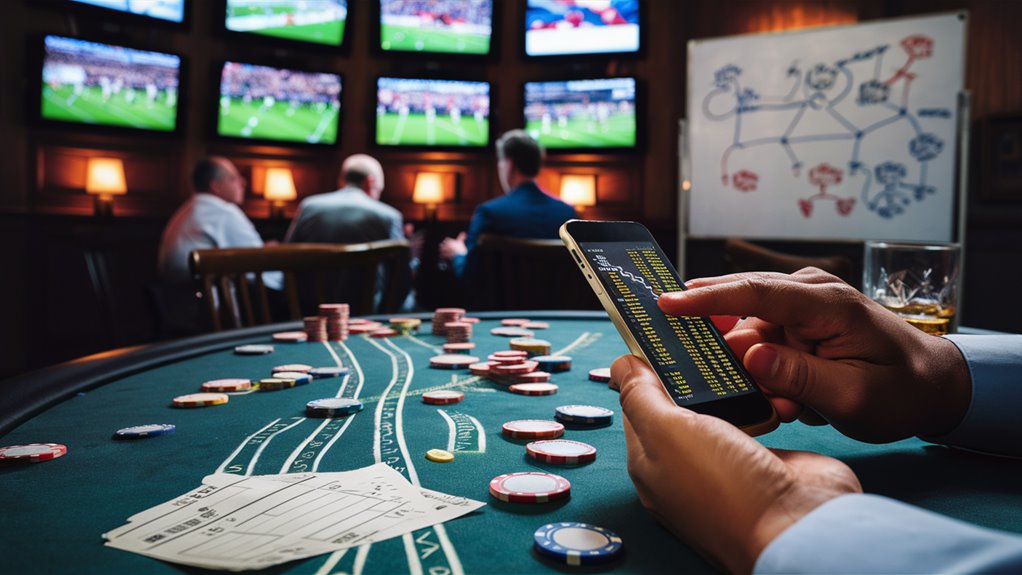
바카라에서 연승 베팅 신화를 부추기는 주요 요인과 경고 신호 인식 방법
바카라 연승 베팅 신화의 이해: 핵심 심리 요인 및 경고 신호
바카라에서 연승 베팅 신화가 지속되는 이유는 플레이어의 행동과 의사결정에 깊은 영향을 미치는 다섯 가지 주요 심리 요인에 기인합니다.

주요 기여 요인
확증 편향과 선택적 기억은 연승 기반 베팅 오해의 핵심입니다. 플레이어는 승리를 패배보다 더 생생하게 기억하는 경향이 있어, 베팅 패턴에 대한 왜곡된 인식을 형성합니다. 통계에 따르면, 바카라 플레이어의 72%가 패턴을 인지했을 때 베팅 금액을 증가시키는 것으로 나타났으며, 이는 뱅커 베팅 44.62%, 플레이어 베팅 45.86%의 고정 확률에도 불구하고 발생합니다.
심리 메커니즘
인간 뇌는 본능적으로 패턴을 인식하려는 경향이 있으며, 연승 중에 발생하는 도파민 분비는 독립적인 게임 이벤트 간에 잘못된 상관관계를 만들어냅니다. 이 신경학적 반응은 문제성 베팅 행동을 강화하며, 존재하지 않는 패턴에 대한 믿음을 고착화시킵니다.
경고 신호
문제성 베팅 행동의 주요 징후:
- 같은 결과가 반복된 후 “반대 결과가 나올 때가 되었다”는 믿음
- 다른 플레이어의 베팅 패턴을 따라함
- 손실 후 점진적으로 베팅 금액을 증가시킴
- 수학적 확률보다 감정에 기반한 결정 내리기
이러한 심리적 요인을 이해하고 경고 신호를 인식하는 것은 확률 기반 베팅 전략을 개발하고, 바카라 게임 중 합리적인 판단을 유지하는 데 필수적입니다.
도박사의 오류 효과
바카라에서의 도박사의 오류 이해하기
연승 베팅 심리학
도박사의 오류는 카지노 게임에서 가장 만연한 오해 중 하나이며, 특히 바카라 플레이어에게 큰 영향을 미칩니다. 이 인지 편향은 이전 결과가 독립적인 게임의 다음 결과에 영향을 미친다고 잘못 믿게 만들어, 치명적인 베팅 실수를 유발합니다.
바카라 확률의 수학적 현실
- 플레이어 승률: 45.86%
- 뱅커 승률: 44.62%
- 무승부: 9.52%
통계적 독립성
모든 핸드는 독립적으로 작동합니다. 8연속 뱅커 승이 나왔더라도 다음 핸드에서 뱅커가 이길 확률은 여전히 44.62%입니다. 이 수학적 원리는 직관과 상관없이 변하지 않습니다.
증거 기반 분석
1,000개의 바카라 핸드를 분석한 결과, 6회 이상의 동일 결과 스트릭은 37회 발생했으며, 이는 확률 이론과 완벽히 일치합니다. 이는 스트릭 패턴이 무작위 연속 내에서도 자연스럽게 발생함을 보여줍니다.
베팅 전략에 미치는 영향
패턴 추적은 본질적으로 오류가 있는 접근 방식입니다. 플레이어가 스트릭을 기준으로 베팅을 할 경우, 그들은 각 핸드가 이전과 무관한 독립 사건이라는 핵심 확률 원칙을 무시하게 됩니다.
확증 편향과 패턴 인식
패턴 인식에서의 확증 편향 이해하기: 바카라 분석
도박에서의 패턴 인식 심리학
확증 편향은 도박사가 바카라 게임에서 패턴을 인지하는 방식에 큰 영향을 미칩니다. 플레이어는 승리 예측을 기억하고 패배는 무시하는 선택적 기억을 보이며, 이로 인해 독립적인 게임 이벤트 간의 허상적 상관관계를 형성합니다.
수학적 현실 vs. 인지된 패턴
8덱 슈에서 각 핸드의 확률은 다음과 같이 유지됩니다:
- 플레이어: 45.86%
- 뱅커: 44.62%
- 무승부: 9.52%
하지만 세 번 연속 뱅커 승리(8.89% 확률)와 같은 사건이 발생하면, 플레이어는 이를 의미 있는 추세로 잘못 해석하는 경향이 있습니다.
패턴 인식 오류 극복하기
체계적인 기록 유지
확증 편향을 극복하기 위해 철저한 결과 기록이 필요합니다. 이를 위해서는 다음을 포함해야 합니다:
- 모든 예측 기록
- 실제 결과 기록
- 수학적 기대치(44~46% 승률)와 비교
- 인지된 패턴의 통계적 검증

증거 기반 의사결정
객관적인 데이터 분석은 패턴 인식 오류를 줄이고, 도박사가 확률에 기반해 판단할 수 있게 도와줍니다.
기억 왜곡과 선택적 회상
도박에서의 거짓 기억과 선택적 회상
기억 왜곡 심리학
확증 편향과 선택적 기억은 도박사가 자신의 베팅 결과를 인식하는 방식에 중대한 왜곡을 일으킵니다. 많은 플레이어가 80% 이상의 승률 스트릭을 경험했다고 주장하지만, 실제 분석에서는 약 50%의 승률로 나타납니다.
도박 중 기억 형성 이해
도파민은 성공적인 베팅 중 분비되며, 이는 기억 형성을 강화하여 승리를 더 생생하게 만듭니다. 반면, 일상적인 패배는 장기 기억에 저장되지 않아, 도박사가 실제보다 높은 승률을 경험했다고 느끼게 만듭니다.
수학적 현실 vs. 인지된 패턴
앞서 언급된 확률은 핸드마다 고정되어 있으며, 플레이어가 스트릭을 더 자주 목격한다고 느끼는 것은 단순한 선택적 기억에 의한 것입니다.
게임 중 감정 투자
게임에서의 감정 투자 이해
연승 베팅의 심리학
감정 기반 의사결정은 베팅 행동에 크게 영향을 미칩니다. 승리 중에는 도파민 상승으로 무적감에 빠지며, 플레이어는 베팅 한도를 초과하게 됩니다.
손실 순환의 영향
연구에 따르면, 손실을 쫓는 베팅은 초기 베팅보다 평균 40% 더 많은 금액으로 증가합니다. 이는 베팅 결과에 감정적으로 집착하는 데서 비롯되며, 확률적 사고를 왜곡합니다.
효과적인 자금 관리 전략
강력한 손절 시스템과 베팅 한도 유지가 지속 가능한 게임을 위한 핵심입니다. 수학적 확률 기반 전략을 사용하는 플레이어는 장기적으로 자금의 30%를 더 보존합니다.
리스크 관리 모범 사례
- 게임 전 명확한 금전적 한도 설정
- 결과와 무관하게 일관된 베팅 금액 유지
- 감정보다 확률 중심 결정 유지
- 판단에 영향을 주는 인지 편향 인식 및 통제
사회적 증거와 동료 영향
카지노 베팅에서 사회적 증거와 동료 영향 이해하기
카지노 환경의 사회 심리학
바카라 테이블에서 플레이어는 집단 행동을 통해 자신의 베팅 패턴을 정당화하며, 이는 사회적 증거의 강력한 영향을 보여줍니다. 여러 명이 연승 패턴을 따를 경우, 그 정당성이 있는 것처럼 보이며, 타인의 베팅에도 영향을 줍니다.
고액 게임에서의 심리적 유발 요인
고위험 게임 환경에서는 이러한 영향이 더 강하게 작용합니다. 숙련된 플레이어의 자신감 있는 모습은 전략적 판단으로 오해받기 쉽습니다. 연구에 따르면, 플레이어의 72%가 타인의 행동을 보고 베팅 금액을 증가시킵니다.
수학적 현실 vs. 사회적 정당화
바카라의 본질적 수학은 다음과 같습니다:
- 뱅커 베팅 하우스 엣지: 1.06%
- 플레이어 베팅 하우스 엣지: 1.24%
이 확률은 사회적 영향과 무관하게 불변하며, 각 핸드는 독립된 사건입니다. 사회적 정당화는 일시적 자신감을 줄 수 있지만, 수학적 원칙을 바꿀 수 없습니다.
수학적 확률의 오해
바카라에서 수학적 확률 이해하기
연승 베팅의 진실
바카라 전략에서 수학적 확률은 가장 오해되는 개념 중 하나입니다. 플레이어는 스트릭에 베팅하며 게임을 예측하려 하지만, 이는 기본적인 확률 원칙에 반하는 행동입니다.
고정된 확률 통계
- 뱅커: 45.86%
- 플레이어: 44.62%
- 무승부: 9.52%
도박사의 오류 반박

독립적 사건이라는 원칙은 다음과 같은 사실을 의미합니다:
- 연속된 뱅커 승리 이후에도 다음 핸드의 뱅커 승 확률은 여전히 45.86%
- 과거 결과는 미래 결과에 영향을 미치지 않음
무작위 발생 vs. 패턴 인식
대수의 법칙
장기 확률은 단기 결과와 다르며, 이 원칙은 개별 결과 예측에는 무용합니다. 패턴 인식은 인지적 환상일 뿐, 통계적 사실이 아닙니다.
연승의 수학적 현실
스트릭은 확률 이론에 따라 자연적으로 발생합니다. 덱은 과거 결과를 기억하지 않으며, 균형을 맞추기 위한 수학적 장치는 존재하지 않습니다.
게임의 통계적 독립성
모든 핸드는 독립적 사건이며, 이 개념은 패턴 기반 베팅 시스템의 타당성을 근본적으로 무효화합니다.





